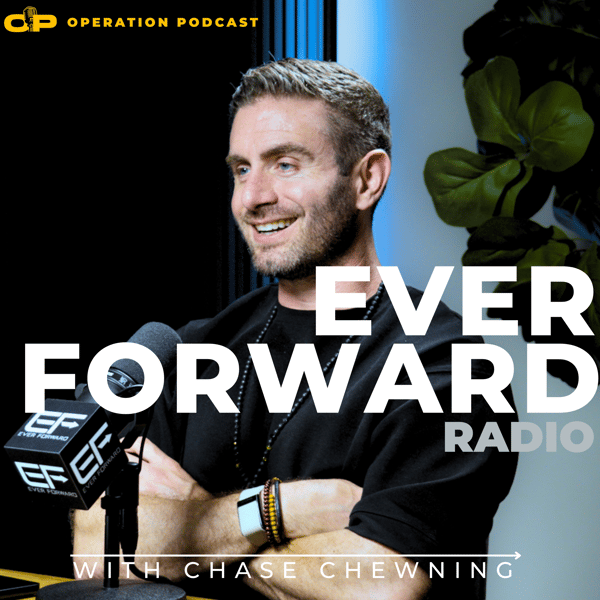EFR 689: Operating Manual for Human Performance, the Best Form of Exercise for the Brain, and How to Prevent Stroke, Cardiovascular Disease and Alzheimer's with Louisa Nicola
Ever Forward Radio with Chase Chewning
Chase Chewning
5 • 927 Ratings
🗓️ 13 March 2023
⏱️ 48 minutes
🧾️ Download transcript
Summary
Neurophysiologist and brain coach, Louisa Nicola, is back to talk about how to optimize brain health and performance with exercise. Louisa sheds light on why exercise is so important for brain function, the best form of exercise for the brain, and how to take control over your brain health to prevent stroke, cardiovascular disease, and Alzheimer’s disease.
If there’s one episode that will persuade the most sedentary person to finally prioritize exercise in their life, it’s this one. Louisa shares some incredible facts about the brain, disease, and exercise that will make you less scared of disease and more empowered to take care of your body.
Louisa Nicola is a neurophysiologist, brain coach to elite athletes, and Founder of Neuro Athletics, a full-service neuroscience diagnostic testing company.
Follow Louisa Nicola @louisanicola_
Follow Chase on Instagram @chase_chewning
Follow him on Twitter @chasechewning
Key Highlights
- To optimize your performance at work and consistently operate at your best, you need to think of yourself as an athlete. An athlete bases their life on the tactics of their sport (their job), the technical side, the sports psychology side, nutrition, and strength. “If you base your life on those pillars, the ROI is exponential,” Louisa says.
- What does neuroscience currently say about the benefits of exercise on brain health?
- Louisa explains the difference between exercise and physical activity, noting why resistance training is better for the brain than aerobics. She details a study that shows a reversal in mild cognitive impairment (pre-dementia) from just six months of exercise alone.
- You are in control of your brain health. Lifestyle interventions give you the control over developing/preventing stroke, cardiovascular disease, and Alzheimer’s disease.
- Start to assess yourself. The #1 thing that is controllable, yet can collapse the capillaries in your brain, is consistent high blood pressure (hypertension), which can decrease brain function. Do you check your blood pressure regularly?
- Louisa shares why she’s so intrigued by vascular health right now and the crucial role your veins play in brain health.
Episode resources:
- Get your FREE variety pack of Recharge electrolyte drink mix with any purchase at https://www.DrinkLMNT.com/everforward
- Save 10% on Ketone-IQ with code CHASE at https://www.HVMN.com
- Save 15% on grass fed beef sticks with code EVERFORWARD at https://www.Paleovalley.com/everforward
- Watch and subscribe on YouTube https://youtu.be/wRvHVLzykew
- Louisa has also been in episode 436 and episode 624
Transcript
Click on a timestamp to play from that location
| 0:00.0 | The following is an operation podcast production. |
| 0:03.3 | This was all just reserved for elite athletes and I used to think to myself, you know, when I retired, I retired in 2012 from triathlon. |
| 0:10.8 | I used to think, why isn't everybody treating their bodies like elite |
| 0:15.9 | athletes because if they did they probably be able to perform better in their |
| 0:20.4 | field. Take a salesperson for example because I do a lot of workshops with |
| 0:24.1 | salespeople and one of the biggest things that they, you know, a sales manager will say is how |
| 0:29.8 | can we get our sales people to perform better and I'm like well treat them like |
| 0:35.5 | athletes so that you know we go out we do workshops and it's literally called |
| 0:40.0 | perform like an athlete an operating manual to human performance. |
| 0:44.0 | All right, so by now you probably are familiar with the term electrolytes and how important they are for |
| 0:49.6 | hydration. Look, staying hydrated is more than just about getting adequate water throughout the day is also all about the magic ratio, which is why my trusted resource for electrolytes now for about three years has been element. |
| 1:04.0 | Why is supplementing with this ratio of electrolyte's important? |
| 1:06.8 | Well, electrolyte deficiency or imbalances can cause symptoms like headaches, |
| 1:11.3 | cramps, fatigue, and weakness. And if you're like me and you're out there |
| 1:14.5 | training most days of the week, when we sweat, the primary electrolyte we lose is sodium. We can lose |
| 1:20.4 | up to 7 grams per day, in so when sodium isn't replaced it's common |
| 1:25.2 | to experience muscle cramps and fatigue and overall low recovery rates and just |
| 1:30.8 | for the general health goer electrolytes also play a critical role in many other conditions and serve other functions, serving your brain and mental health, even regulating appetite and curbing cravings and so much more. |
| 1:44.2 | Free variety sample pack with any regular purchase simply |
| 1:47.3 | head to drink element.com slash ever forward to snag this exclusive deal. Personally, I love their orange. I love |
| 1:55.4 | watermelon. I honestly haven't found a flavor I don't enjoy. I take it in the |
| 1:59.4 | morning with my greens with my water, especially when I'm traveling, staying hydrated with proper electrolytes |
... |
Please login to see the full transcript.
Disclaimer: The podcast and artwork embedded on this page are from Chase Chewning, and are the property of its owner and not affiliated with or endorsed by Tapesearch.
Generated transcripts are the property of Chase Chewning and are distributed freely under the Fair Use doctrine. Transcripts generated by Tapesearch are not guaranteed to be accurate.
Copyright © Tapesearch 2025.

